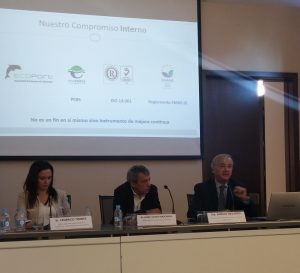
The PAV benefits port companies that adopt environmental measures.
More than four million euros have been reinvested in new measures to improve the environment.
Valencia, October the 25th 2017. – Federico Torres, director of security, environment and facilities of the Port Authority of Valencia (PAV) has participated in the 1st Social Responsibility Week in the Valencian Community that is held until next October 27. In his speech, “The reduction of CO2 emissions in the Port of Valencia”, Torres explained the evolution and the commitment made by the Port Authority of Valencia in environmental matters.
Federico Torres explained during his presentation that “most of the Spanish ports are artificial ports because there have been created by the human hand to generate industrial activity and generate an impact; therefore, we want to be consistent with this situation and with the society with which we relate.” In this sense, Torres reminded that the PAV signed its first Environmental Policy in 2000 and, since then, the commitment of the institution has been to try to reach the highest standards in terms of specific environmental regulations.
During his presentation Torres has influenced the effort that the PAV is making to integrate the environmental and evolutionary variables of the environment such as the reduction of emissions, “a concept that gives a very clear perspective of which is the functioning of an organization in terms of the minimization of the effects that we generate because we mustn’t forget that any activity generates an impact. Therefore, it is important to know it, measure it, quantify it to be able to take measures to improve and reduce that impact. ”
In this sense, Torres reminded that the port of Valencia is aligned with the environmental objectives set by the European Union and, specifically, with the so-called Triple 20, which focuses on reducing emissions, the use of renewable energies and the increase of energy efficiency. In this context, the modifications of the environmental policy of the institution that was approved last year and that incorporated these concepts on energy efficiency are framed.
Federico Torres continued saying “From the PAV it came to concretion that in order to be coherent with these European objectives, we had to analyze the effect of our carbon footprint, a measurable and representative value of port activity, which should serve as guide to promote improvement actions “. Torres reminded that Valencia was the first port in the world to verify its Carbon Footprint under the ISO 14064-1:2012 standard that includes the emissions of the PAV itself and the concession companies, ships and land transport produced in the interior of the port area of Valencia. In six years, the PAV has managed to reduce its carbon footprint from 3.12 to 2.58 kgCO2 equivalent per ton moved, a period in which port activity has increased by 14%.
Torres also stressed that in order to arrive to these data, it was necessary to carry out a preliminary analysis of the activities carried out in port environments, processes, consumption and use of machinery. This study was carried out in 2008, through the Climeport European project in which, in addition to Valencia, the ports of Livorno (Italy), Koper (Slovenia), Piraeus (Greece), Marseille (France) and Algeciras participated. “This project, besides serving to initiate the measurement of the carbon footprint, also allowed us to carry out a study on what is the port area reality. This study found that, in the case of the port of Valencia, 45% of the effects of CO2 gases come from ships, 25% of the port machinery, 12% of traffic and only 1% of the activity of the Port Authority itself. This is why the collaboration and active involvement of the entire port community to reduce emissions was so important “.
To achieve the collaboration of the entire port environment, the PAV has four main action lines: the Ecoport II project that has allowed 23 port companies to have ISO 14001 standards and 6 with the European EMAS environmental management and audit certificate; environmental reports, specific environmental guidelines and good practice agreements. In addition, Federico Torres reminded that “the PAV subsidizes port companies for their adoption of environmental measures but, at the same time, we force them to allocate part of this bonus to new environmental measures so that we promote continuous improvement of the companies that are in the port area in the environmental sector. In fact, of the 6 million euros that we have subsidized, more than 4 million have already been reinvested in environmental improvements.”
In this line, Federico Torres has also highlighted that “from the PAV we have given access to companies to environmental projects that result in improvement of machinery, replacement of old equipment, reduction of consumption, use of dynamic lighting, among others, which has allowed to increase the energy efficiency of the area by 25% “.
Torres has concluded that “Our commitment to environmental improvement and within the concept of CSR has led us to take this qualitative step that has been a process that we have been working on for years to give the best possible content in terms of environmental aspects within the sector in which we move “.

